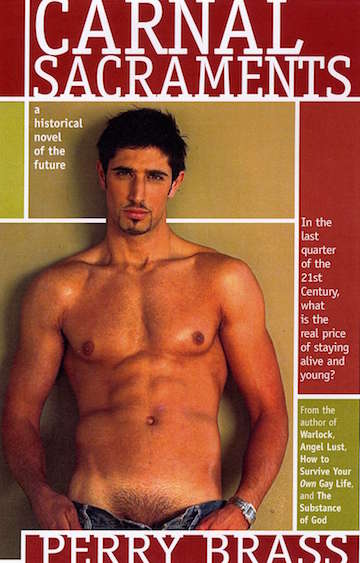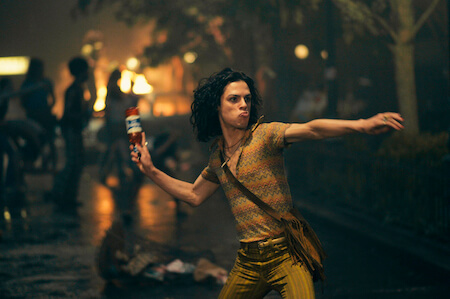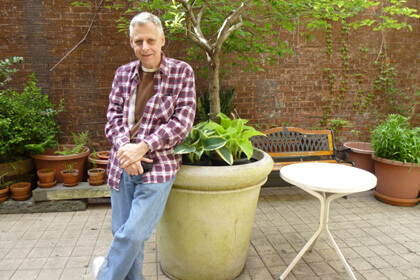John Mitzel, 1948-2013. | COURTESY OF BRIAN GALE
John Mitzel, the proprietor of Calamus Bookstore — Boston’s lesbian, gay, bisexual, and transgender bookstore — died on October 4 in his home in Arlington, Massachusetts. His death was the result of a long series of physical ailments, some related to alcohol and most recently a battle with oral cancer.
Mitzel — as he was publically known to everyone, although some friends, myself included, called him John — was, for over four decades, a central figure in Boston’s queer community. I have such a long history with John it is almost impossible to detail everything he meant to me, or what he did for the LGBT community in Boston he both loved and often railed against.
John and I met in 1971, soon after I arrived in Cambridge, at a Fag Rag meeting. Fag Rag, the first national gay male periodical, had started the year before and had published two issues. It was published by an anarchist collective and connected to Gay Men’s Liberation, Boston’s Gay Liberation Front. Coming from Gay Liberation circles in New York, I immediately joined GML. By 1973, John and I were fast friends and probably spoke on the phone almost every day since then.
Pioneering Boston Gay Liberationist was a lifetime organizer, writer, and bookseller
John, born in 1948, was a private person. As gregarious as he was — and he was compulsively so — he almost never spoke about his inner life. Every now and then the private side and history slipped out. He was institutionalized, and rumored to be given shock treatments, in his teens by his family for being homosexual and apparently tried to run over his high school principal with a car. He seemed to be completely distanced, more than many of us, from his biological family, though this changed later in life when he become close to his parents and his brother David. He drank. I suspect he drank — seriously drank — everyday since I met him.
I probably knew John better than — or certainly as much as — anyone. And to me much of his inner life remains something of a mystery. I have no clear idea of his romantic passions, or even really of his sex life, although clearly his passion for wearing uniforms — police uniforms for special occasions, often security guard uniforms for everyday and work wear — was a hint of his erotic fantasy life.
Coming of age in a movement predicated on consciousness-raising and the insistence that the “personal was the political,” John remained resolutely, obstinately private. But since his death I have, for the moment, stopped wondering about the “real John” but have accepted his elusiveness and have come to terms with the fact that the “real John” may well have been the public John.
John was passionate about two things: community and writing. He understood the importance and the visceral presence of a community. He was actively, and continuously, involved in its constant creation, as a writer, organizer, speaker, and – in the best, gayest sense of the word — gadfly. A brief look at his political and publishing career tells the story. He was a founding member of the Fag Rag collective in 1971. He helped found the Good Gay Poets collective in 1973, even though he professed to hate poetry. (As usual, his perversity emerged as he secretly wrote it and published a book of his collected poetry earlier this year.) He was a founding member of the Boston Gay Review, a gay male literary journal, in 1976. He founded Stonewall Distributors, a gay book and magazine distribution non-profit, in 1975. He wrote numerous articles for Boston’s Gay Community News in the 1970s and 1980s. He wrote a column in Philadelphia Gay News for years during the same period. For nearly 20 years he wrote a monthly column, “Common Sense,” for The Guide, a Boston-based gay travel and political magazine. As a publisher, he started Manifest Destiny Press in the 1970s and Calamus Books, a press that emerged from the bookstore in 2002.
As an organizer, John worked on Gay Pride committees, formed working coalitions against archaic sex laws, and organized rallies against Anita Bryant, anti-porn laws, and violence against the LGBT community. It was a full public life that made a mark and was appreciated. His work came from two beliefs — the importance of community and the power of writing. For four decades, he sought to combine these in his efforts.
And he did. John’s essays and columns, often iconoclastic and cranky, were very important for mapping out new ways of thinking. He emulated H.L. Menken, but with a queer sensibility. He was, in many ways, an editorialist of the first rank. But John never became the famous writer he wanted to be — who does? — and wanted particularly to be seen as a great fiction writer. His self-published, novels “Inferno Heights” and “Doubly Crost” (both 2009) are frenzied, metaphysical, hallucinogenic gay fantasias on politics and life that feel stuck in the satiric traditions of James Campbell and Carl Van Vechten but never find a life of their own. John’s encyclopedic knowledge of American literature was amazing, but he was often tripped up by imitation.
On the other hand, his short stories —– collected in “Some Short Stories about Nasty People I Don’t Like” (1977) and “Last Gleamings” (2013) are deft and smart. “How to Write a Short Story” (in “Last Gleamings”) is as good as anything Dorothy Parker ever wrote. But John wanted to be Gore Vidal — urbane, original, on point, and always on target. But that slot was taken and John’s talents, while prodigious, were not suited for this. I think that John’s feeling that he was not a literary success was a bane in his life. Ironic, as others did consider him successful.
While a talented, if quirky, writer and organizer, John’s genius was in creating spaces for people to come together. The salon is a European notion, but John was a master at creating these in the Boston queer community. When John was the cashier at Boston’s South Station Cinema — Boston’s first gay male porn theater — its office and lobby became the public meeting place of writers, artists, thinkers, and assorted intellectuals all mingling art and politics with the occasional dip into the theater’s back rooms for sex. In the 1980s, when John managed Glad Day Bookshop, first on Winter Street and then Boylston Street — he recreated this same setting (alas, without the porn or opportunity to have sex in the back room). In 2000, after Glad Day closed, and he opened Calamus Bookstore — truly his own space — he created an environment that fostered community, a vibrant intellectual environment in which gay men could come together. (While John’s stores carried a full range of LGBT books, his interests, as they were in Fag Rag, were basically focused on the gay male experience. I write this not to apologize or critique him, but it was a reality of his life. )
John, alas, was a terrible businessman. He gave books to friends, never charged enough for rare, out-of-print material, marked old porno magazines down to give-away prices. The business didn’t interest him that much. Many times I wished Calamus was more Barnes & Noble than Gertrude Stein’s sitting room. But the store (often barely) survived and continues — and Brian Gale, John’s assistant, will ensure new management guidance, which focuses, for example, on online sales in a way John never did.
But what is clear is that the passing of John Mitzel is one more death in the generation who invented and fought for Gay Liberation. Having gotten through the massive devastation of the AIDS epidemic, we are now seeing the slow diminishment of an army of women and men who envisioned a new world of sexual and personal liberation never conceived of before 1969. Many, if not most, Fag Rag members are gone. GLF and GML members are in their 60s, 70s, and even 80s. There is a sadness in this, but these new deaths are age-related, not due to government negligence. Though they are to be expected, they are still a marker for the end of a cultural moment. Plenty of young women and men do political work today — that will always continue — but the lives of the first wave of the first generation of Gay Liberationists are, person by person, coming to a close. In this new marriage equality moment — which is really, profoundly, about privacy — I’ve been thinking about what it means to be public. Maybe John’s private life — any private life — doesn’t matter as much as our public lives, what we do in the world.
This is how I would like to remember John: We are at a leisurely lunch at Piccola Venezia in Boston’s North End. It is 1978. I am between deadlines, he is on break from what he called the “porno palace.” It is summer, the windows are open. We are discussing James Purdy’s just published “Narrow Rooms” and planning a new issue of Boston Gay Review. He is finishing his second glass of wine. I am picking at the end of my shrimp scampi lunch special. We are in the midst of what we see as a cultural revolution and the remaking of the worlds in which we grew up. We are both talking intensely and often lapse into silences, as though there is everything and nothing more to say.



































